Question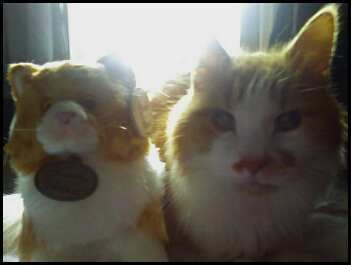 my cat Tootie xo
my cat Tootie xo
QUESTION: I have a 19 yr old cat who is not eating. I took him to the vets last DEC. for the same reason and they gave me steroids to boost his appetite.He had blood taken and His kidneys are good for a old cat. This time I tried the steroids and he is barely eating..a very little bit yesterday,drank water(he loves water) but not much so far today. He has always been a lite eater but I am very worried. I feel like the vet won't help me much,she had no idea what was wrong with him before. Also I got a new cat from a rescue 2 Mon. ago. She is a very sweet cat and is upstairs most of the time and he is downstairs(w/me)in the back bedroom. He was not very happy about the new cat. He has been w/ other cats in the past but it has probably been 3 yrs since. Do you know if a cat can just give up and die over another cat? I have heard this from someone. I feel so guilty. I am with my old cat a lot and show him lots of attention. I just gave him some senior cat milk w/ vitamins from a eyedropper. He doesn't seem like he is in pain..he is still purring and talking to me. :(
ANSWER: Sharon,
A 19 year old kitty is roughly equivalent to a 92 year old human being. At this point in his life it would be best to minimize the stress on him - adopting a new kitty right now may not have been the best decision to make, however you have made a commitment to this new kitty. It's very important to remember that you made a commitment to your elderly cat when he first came into your life as well, at this point the best thing that you can do to honor the commitments you've made to both cats and reduce Tootie's stress levels is to confine the new kitty to a single room with all of his necessities. Cats are very territorial and new cat introductions shouldn't be done without proper preparation. I recommend isolating new cats for a minimum of 2-3 weeks, partially to help the resident cat become familiar with the new kitty's scent and help the resident cat get used to the idea of sharing his home with another cat, the other reason that I recommend confining new cats to a single room is because there's always a possibility that a new cat could have a viral or bacterial infection that can be passed on to your resident cat and in the case of an elderly cat that's a bad situation. If Tootie still isn't comfortable with the new cat after he's been properly introduced then you may want to think about confining the newcomer to a smaller area of your home so that your resident cat still has most of what he's used to having access to.
Having a vet that you trust and have confidence in is extremely important for your cat's health. The fact that Tootie's not eating could be a sign of many serious health problems or it could simply be related to the fact that his senses aren't as sharp as they once were and he's having trouble smelling his food. I really do think that a visit to the vet is warranted, if you don't feel confident with your current vet call around to other clinics in the area and find a vet that you are comfortable with. At 19 years old when a cat has a loss of appetite there's a chance that his kidneys are beginning to fail and he is in need of some daily support in the form of subcutaneous fluids to help keep him comfortable, but this can only be determined by a vet. Since a cat who has lost his appetite can become very sick as a result (especially given the fact that your kitty is older) this is a situation that requires a medical assessment at the very least. If the exam and tests show no obvious cause for the lack of appetite you can try a few simple tricks.
Sometimes an older cat's sense of smell isn't what it used to be and if a cat can't smell their food they generally won't eat it. You may find that offering Tootie some high quality canned food made from human grade ingredients (the better quality foods are a better choice because the cat can actually absorb the nutrients in the food - Wellness and Spot's Stew are two good choices in this case) that has been slightly warmed in the microwave. Be sure that you stir the food thoroughly and check that it doesn't have any hot spots that could burn your kitty's mouth. Heating the food to body temperature will increase the cat's interest if his appetite issues are related to not being able to smell his food because the heated food has a stronger smell. Other tricks you can try include offering your kitty special treats like cooked salmon, chicken (or other poultry including duck, goose, etc), lamb or beef. I would advise against feeding your kitty canned salmon at his age, you would be much better off to cook up a salmon steak and debone it before serving, you'll want to serve the fish with the skin left on (it contains nutrients that your kitty needs). Some cats love lamb so it's worth a try. Another useful tip is that your kitty may not have the urge to eat large meals as he may have when he was younger, you could try offering small meals (roughly 1-2 tablespoons of food) every few hours to see if that changes Tootie's interest in food.
If all of these tips fail to increase Tootie's desire to eat your vet may be able to recommend a special diet that can be fed to your kitty via syringe - it's my understanding that there is a product available at Petsmart in the area where you will find the kitten milk replacers, it's like Ensure or Boost for elderly cats. It's a bit on the pricey side, but it may help Tootie to regain his appetite if he's getting some nutrition and fluid and he starts to feel better. Sometimes when a cat doesn't eat for awhile he loses the urge to do so, if nothing is done this can cost a cat his life quite quickly so it's important to get started as early as you can, find out what's causing the appetite issues if possible, see if you and a vet can come up with a reasonable plan to correct the issue. If there isn't anything that can be done to help Tootie overcome this latest health issue then it may be time to start thinking about the decision that most pet parents must face at some point in their companion's life. A tough part of making a commitment to a pet includes allowing them to die with dignity in a humane and peaceful manner and if Tootie doesn't respond to treatment this may be something you'll have to consider. My thoughts and prayers are with you and Tootie at this time and it's obvious to me that you love him very much and you seem to want to do what is best for him. May you have the courage and wisdom to deal with the tough decisions that may lay ahead. I'm more than willing to offer some help and support if it's necessary for you to make the toughest decision that any pet parent ever faces during the lifetime of a much loved pet.
---------- FOLLOW-UP ----------
QUESTION: Thank you so much Ali. I took him to the vets and they did a few tests and gave him liquids and a appetite booster that lasts 3 days. He is home now and ate a little food. I am going to try some of your suggestions with the feeding. I appreciate it so much. Thank you for taking the time for our sweet Tootie.
AnswerSharon,
You're very welcome, I'm glad that I could offer some tips that might help Tootie continue to live a happy, healthy life with you during his "Golden" years. It's obvious that you love Tootie very much and I'm sure that he's going to be around to enjoy your relationship for awhile yet. I would certainly appreciate hearing updates from time to time letting me know how Tootie's doing, so feel free to send some along if you'd like. In the event that the site tells you that you've asked one too many follow ups you can simply return to the expert menu and ask a question following the steps you used the first time around. My thoughts and prayers are with you and Tootie - I hope that you both continue to enjoy your time together, it's obvious he's lived a happy life with you for many years.


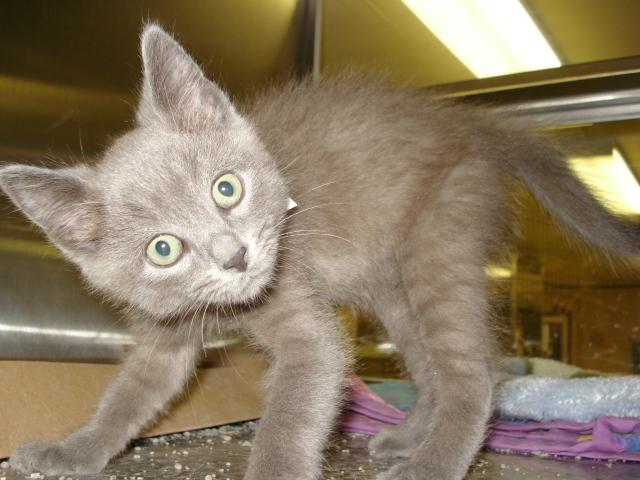 Rehabilitating aggressive rescue cat!
QuestionA friend of me and my husbands was told a week
Rehabilitating aggressive rescue cat!
QuestionA friend of me and my husbands was told a week
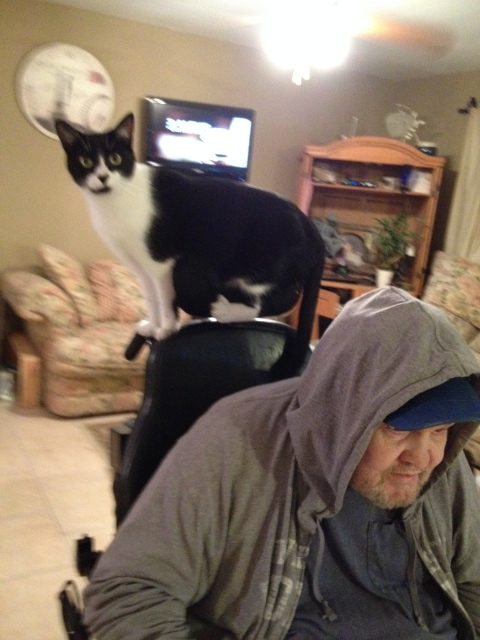 testosterone replacement for neutered male cat
Question
Monkey riding on dads Monkey sleeping h
testosterone replacement for neutered male cat
Question
Monkey riding on dads Monkey sleeping h
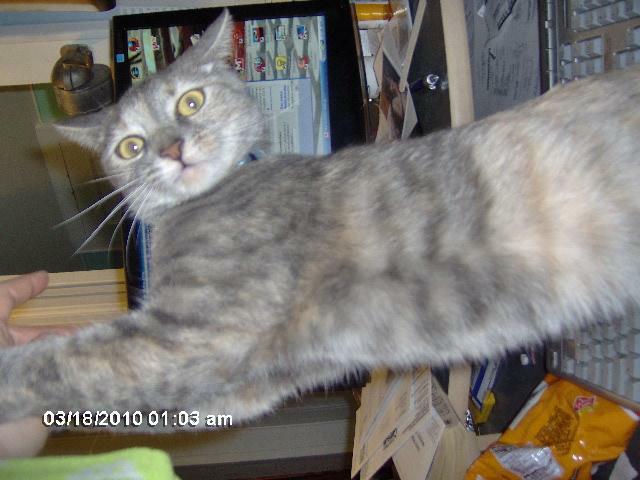 my cat is REALLY long, like a weasel!
QuestionQUESTION: Im hoping you can help me identify my
my cat is REALLY long, like a weasel!
QuestionQUESTION: Im hoping you can help me identify my
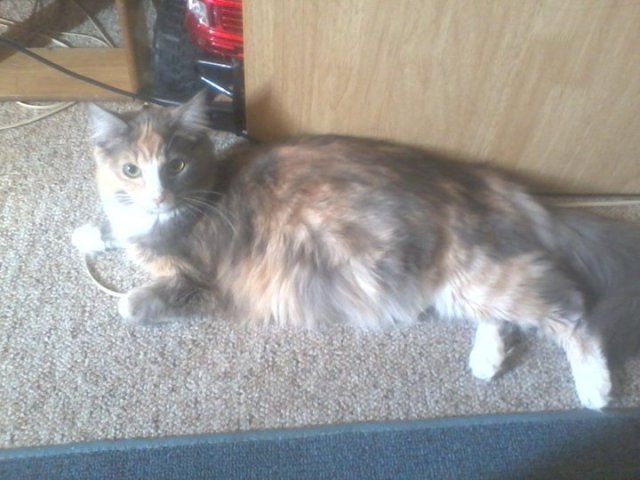 wonderin??
Question
CIara
Hi Karen,
This is my first time dealing
wonderin??
Question
CIara
Hi Karen,
This is my first time dealing
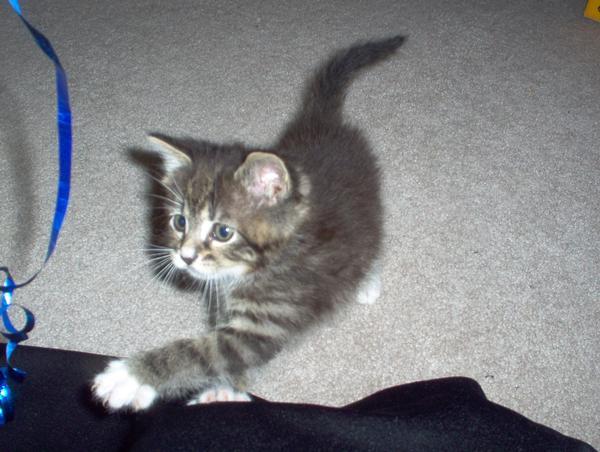 runts
Question
stubby(my cat)
Can the mother chew off
runts
Question
stubby(my cat)
Can the mother chew off